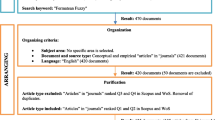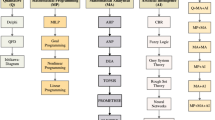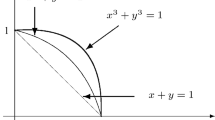Abstract
Hesitant fuzzy soft set (HFSS) can be considered an effective parameterized tool for dealing with vagueness and uncertainty. Considering that the classical HFSS does not involve the importance of all of the possible membership degrees of each element, in this paper, a new concept of weighted hesitant fuzzy soft set (WHFSS) is proposed by assigning a weight vector to all of the possible membership degrees of each element. First, we introduce the definition, basic operations, and score function of WHFSS. Then, some kinds of weighted hesitant fuzzy soft aggregation operators are proposed to incorporate two important weighting factors in terms of membership values and parameters. Furthermore, based on the proposed operators, we develop a novel approach for multi-criteria group decision making (MCGDM) under a weighted hesitant fuzzy soft environment. It can flexibly handle HFSS-based MCGDM problems with complete or incomplete information as input in two cases (experts’ weights unknown or known). Meanwhile, two corresponding algorithms to determine the membership weights are developed, respectively. The newly proposed method can guarantee assessment consistency when each expert may provide more than one evaluation value in final group decision-making, especially in the case of experts’ weights being unknown. Compared with some existing approaches in HFSS, the presented method utilizing a WHFSS-based decision model builds on the existing data without adding any extra elements to represent the unknown possible membership values. It is more objective and reasonable to measure the consistency of assessment between decision-makers. Finally, the effectiveness and practicality of our proposed approach are demonstrated by some illustrative examples.
Similar content being viewed by others
Change history
28 June 2023
A Correction to this paper has been published: https://doi.org/10.1007/s41066-023-00394-x
References
Akram M, Ali G (2021) Group decision-making approach under multi (Q, N)-soft multi granulation rough model. Granul Comput 6(2):339–357. https://doi.org/10.1007/s41066-019-00190-6
Akram M, Martino A (2023) Multi-attribute group decision making based on T-spherical fuzzy soft rough average aggregation operators. Granul Comput 8(1):171–207. https://doi.org/10.1007/s41066-022-00319-0
Alcantud JCR, Santos-García G, Akram M (2022) OWA aggregation operators and multi-agent decisions with N-soft sets. Expert Syst Appl 203:117430. https://doi.org/10.1016/j.eswa.2022.117430
Arora R, Garg H (2018) A robust correlation coefficient measure of dual hesitant fuzzy soft sets and their application in decision making. Eng Appl Artif Intel 72:80–92. https://doi.org/10.1016/j.engappai.2018.03.019
Babitha K, John SJ (2013) Hesitant fuzzy soft sets. J New Result Sci 2(3):98–107
Chen B, Guan Y (2015) Hesitant fuzzy soft sets and their applications in decision-making. In: 2015 12th International Conference on Fuzzy Systems and Knowledge Discovery (FSKD), pp 540–546, https://doi.org/10.1109/FSKD.2015.7382000
Das S, Kar S (2015) The Hesitant Fuzzy Soft Set and Its Application in Decision-Making. In: Chakraborty MK, Skowron A, Maiti M et al (eds) Facets of Uncertainties and Applications. Springer India, New Delhi, pp 235–247
Das S, Malakar D, Kar S et al (2019) Correlation measure of hesitant fuzzy soft sets and their application in decision making. Neural Comput Appl 31(4):1023–1039. https://doi.org/10.1007/s00521-017-3135-0
Fahmi A, Amin F, Ullah H (2021) Multiple attribute group decision making based on weighted aggregation operators of triangular neutrosophic cubic fuzzy numbers. Granul Comput 6(2):421–433. https://doi.org/10.1007/s41066-019-00205-2
Feng F, Li C, Davvaz B et al (2010) Soft sets combined with fuzzy sets and rough sets: a tentative approach. Soft Comput 14(9):899–911. https://doi.org/10.1007/s00500-009-0465-6
Feng F, Wan Z, Alcantud JCR et al (2022) Three-way decision based on canonical soft sets of hesitant fuzzy sets. AIMS Math 7(2):2061–2083. https://doi.org/10.3934/math.2022118
Garg H, Arora R (2017) Distance and similarity measures for dual hesitant fuzzy soft sets and their applications in multi-criteria decision making problem. Int J Uncertain Quan 7(3):229–248. https://doi.org/10.1615/Int.J.UncertaintyQuantification.2017019801
Guleria A, Bajaj RK (2019) On Pythagorean fuzzy soft matrices, operations and their applications in decision making and medical diagnosis. Soft Comput 23(17):7889–7900. https://doi.org/10.1007/s00500-018-3419-z
Hussain A, Ali MI, Mahmood T (2020) Pythagorean fuzzy soft rough sets and their applications in decision-making. J Taibah Univ Sci 14(1):101–113. https://doi.org/10.1080/16583655.2019.1708541
Li C, Li D, Jin J (2019) Generalized Hesitant Fuzzy Soft Sets and Its Application to Decision Making. Int J Pattern Recogn Artif Intell 33(12):1–30. https://doi.org/10.1142/S0218001419500198
Liu Y, Alcantud JCR, Rodríguez RM et al (2020) Intertemporal Hesitant Fuzzy Soft Sets: Application to Group Decision Making. Int J Fuzzy Syst 22(2):619–635. https://doi.org/10.1007/s40815-020-00798-w
Rodzi ZM, Ahmad A (2020) Application of parameterized hesitant fuzzy soft set theory in decision making. Math Stat 8:244–253. https://doi.org/10.13189/ms.2020.080302
Meng F, Chen SM, Tang J (2020) Group decision making based on acceptable multiplicative consistency of hesitant fuzzy preference relations. Inf Sci 524:77–96. https://doi.org/10.1016/j.ins.2020.03.037
Meng F, Chen SM, Zhang S (2020) Group decision making based on acceptable consistency analysis of interval linguistic hesitant fuzzy preference relations. Inf Sci 530:66–84. https://doi.org/10.1016/j.ins.2020.03.070
Molodtsov D (1999) Soft set theory-First results. Comput Math Appl 37(4):19–31. https://doi.org/10.1016/S0898-1221(99)00056-5
Peng X, Li W (2019) Algorithms for hesitant fuzzy soft decision making based on revised aggregation operators, WDBA and CODAS. J Intell Fuzzy Syst 36(6):6307–6323. https://doi.org/10.3233/JIFS-182594. (publisher: IOS Press)
Rezaei K, Rezaei H (2019) New distance and similarity measures for hesitant fuzzy soft sets. Iran Fuzzy syst 16:159–176. https://doi.org/10.22111/IJFS.2019.5026
Sarwar M, Akram M, Shahzadi S (2023) Distance measures and \(\delta\)-approximations with rough complex fuzzy models. Granul Comput. https://doi.org/10.1007/s41066-023-00371-4
Singh S, Lalotra S (2018) Generalized correlation coefficients of the hesitant fuzzy sets and the hesitant fuzzy soft sets with application in group decision-making. J Intell Fuzzy Syst 35(3):3821–3833. https://doi.org/10.3233/JIFS-18719. (publisher: IOS Press)
Suo C, Li Y, Li Z (2021) A series of information measures of hesitant fuzzy soft sets and their application in decision making. Soft Comput 25(6):4771–4784. https://doi.org/10.1007/s00500-020-05485-4
Torra V (2010) Hesitant fuzzy sets. Int J Intell Syst 25(6):529–539. https://doi.org/10.1002/int.20418
Venkata Rao R, Singh D (2012) Weighted euclidean distance based approach as a multiple attribute decision making method for plant or facility layout design selection. Int J Ind Eng Comp 3:365–382. https://doi.org/10.5267/j.ijiec.2012.01.003
Verma R, Agarwal N (2022) Multiple attribute group decision-making based on generalized aggregation operators under linguistic interval-valued Pythagorean fuzzy environment. Granul Comput 7(3):591–632. https://doi.org/10.1007/s41066-021-00286-y
Wang F, Li X, Chen X (2014) Hesitant Fuzzy Soft Set and Its Applications in Multicriteria Decision Making. J Appl Math 2014:643785. https://doi.org/10.1155/2014/643785. (publisher: Hindawi Publishing Corporation)
Wang J, Li X, Chen X (2015) Hesitant Fuzzy Soft Sets with Application in Multicriteria Group Decision Making Problems. The Sci World J 2015:806983. https://doi.org/10.1155/2015/806983. (publisher: Hindawi Publishing Corporation)
Xia M, Xu Z (2011) Hesitant fuzzy information aggregation in decision making. Int J Approx Reason 52(3):395–407. https://doi.org/10.1016/j.ijar.2010.09.002
Yang X, Lin TY, Yang J et al (2009) Combination of interval-valued fuzzy set and soft set. Comput Math Appl 58(3):521–527. https://doi.org/10.1016/j.camwa.2009.04.019
Zeng W, Li D, Yin Q (2019) Group decision making approach of weighted hesitant fuzzy sets. Control Decis 34(3):8
Zeng W, Ma R, Li D et al (2022) Novel operations of weighted hesitant fuzzy sets and their group decision making application. AIMS Math 7(8):14117–14138. https://doi.org/10.3934/math.2022778
Zhang H, Shu L (2016) Dual Hesitant Fuzzy Soft Set and Its Properties. In: Cao BY, Liu ZL, Zhong YB et al (eds) Fuzzy Systems & Operations Research and Management. Springer International Publishing, Cham, pp 171–182
Zhang H, Xiong L, Ma W (2015) On Interval-Valued Hesitant Fuzzy Soft Sets. Math Probl En 2015:254764. https://doi.org/10.1155/2015/254764. (publisher: Hindawi Publishing Corporation)
Zhang Z, Chen SM (2019) A consistency and consensus-based method for group decision making with hesitant fuzzy linguistic preference relations. Inf Sci 501:317–336. https://doi.org/10.1016/j.ins.2019.05.086
Zhang Z, Chen SM (2020) Group decision making based on acceptable multiplicative consistency and consensus of hesitant fuzzy linguistic preference relations. Inf Sci 541:531–550. https://doi.org/10.1016/j.ins.2020.07.024
Zhang Z, Chen SM (2020) Group decision making with hesitant fuzzy linguistic preference relations. Inf Sci 514:354–368. https://doi.org/10.1016/j.ins.2019.11.030
Zhang Z, Wu C (2014) Weighted hesitant fuzzy sets and their application to multi-criteria decision making. British J Math Comput Sci 4:1091–1123
Çağman N, Karataş S (2013) Intuitionistic fuzzy soft set theory and its decision making. J Intell Fuzzy Syst 24(4):829–836. https://doi.org/10.3233/IFS-2012-0601. (publisher: IOS Press)
Çağman N, Çıtak F, Enginoğlu S (2010) Fuzzy parameterized fuzzy soft set theory and its applications. Turkish J Fuzzy Syst 1:21–35
Acknowledgements
The authors are thankful to the editor and anonymous reviewers for their constructive comments and suggestions that helped us improving the paper significantly. This work was supported by the National Natural Science Foundation of China (No.11961045) and Scientific Research Fund of Jiangxi Provincial Education Department (No.150196).
Author information
Authors and Affiliations
Contributions
This paper has been written by only one author. All works related to it have been finished by XW.
Corresponding author
Ethics declarations
Conflict of interest
The authors declare no competing interests.
Additional information
Publisher's Note
Springer Nature remains neutral with regard to jurisdictional claims in published maps and institutional affiliations.
The original online version of this article was revised to correct a formula in Definition 7.
Rights and permissions
Springer Nature or its licensor (e.g. a society or other partner) holds exclusive rights to this article under a publishing agreement with the author(s) or other rightsholder(s); author self-archiving of the accepted manuscript version of this article is solely governed by the terms of such publishing agreement and applicable law.
About this article
Cite this article
Wen, X. Weighted hesitant fuzzy soft set and its application in group decision making. Granul. Comput. 8, 1583–1605 (2023). https://doi.org/10.1007/s41066-023-00387-w
Received:
Accepted:
Published:
Issue Date:
DOI: https://doi.org/10.1007/s41066-023-00387-w




